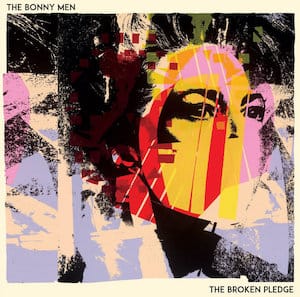 The Bonny Men – The Broken Pledge
The Bonny Men – The Broken Pledge
Self Released – Out Now
I should apologise to you for the slightly delayed arrival of this review. I got side-tracked. My attention got drawn away to many singers and fascinating histories. However, I will lay the blame firmly at the feet of The Bonny Men. Their new album The Broken Pledge is full of tunes and songs from across the ages and in versions learned from so many people that I simply had to follow the trails back. This, of course, is a great example of the tradition continually moving, taking the ideas, the arrangements, the words from one person and then adding your own slant or nuance to pass on to the next generation.
The album came out of work created for a commission by the Genealogical Society of Ireland to perform two concerts encapsulating the music of Ireland from 1616 to 1916. With the exception of two tunes, all the titles are in English and that serves as a reminder of the close ties, and perhaps the bondage, that Ireland has with England. This collection takes a broader look at the social history of Ireland and features songs that can, in the scheme of things, be deemed quite contemporary.
One of these is Tunnel Tigers. The words were written by Ewan MacColl for a 1966 BBC documentary The Irishmen, the story of Irish workers who built the Victoria Underground Line in London. Apparently the film was thought to be too brutal at the time and was never broadcast. The idea of Irishmen digging up England has been around since the days of canal building and yet this is no historical apparition, and even today many have little choice but to go to where the jobs are. The economic migrant is as much a part of our time as it was in the 19th century.
The Sun Is Burning was written by Ian Campbell and very quickly became the unofficial anthem for the anti-nuclear movement of the early 1960s. It has lost none of its power and this version lulls you into a feeling of comfort and rustic grace before delivering the harsh, dark reality that was Hiroshima and is forever a threat.
A jollier song, or at least the tune has more bounce, is An tSean Bhean Bhocht, which if like me your knowledge of Irish Gaelic is very very poor, then at least the repetition of tSean Bhean Bhocht helps train the ear to sing along with a small portion. tSean Bhean Bhocht means ‘Poor old woman’ – Mother Ireland – and dates from the Irish Rebellion of 1798 though the band have added a verse that, the sleeve notes inform us, addresses ‘the inequality and suffering being endured by people in this country [Ireland] and around the world’.
It’s not all dark and there is a lot to dance about on the album with many cracking sets including the jigs Julia Clifford’s/The Chapel Bell, and the reels of the final set The Repeal of the Union/O’Connell’s Trip to Parliament. The Sandmount Reel is coupled with the tune that gives the album its name, The Broken Pledge. There are a number of theories as to how the Broken Pledge got its name, including those traditional stories of young lovers plighting their troth before the man heads off to sea/war/make his fortune, only for one of the pair to be ensnared by a third party. It is however also thought to relate to pledges that potential drinkers – aged 11 or 12 – were asked to make during the temperance movement, many pledges that were no doubt broken…Doesn’t distract from a good tune though.
Rodney’s Glory, almost sedentary as befits an honoured sea captain, moves effortlessly into the flute of Pigeon on the Gate and then into Patsy Touhey’s Reel in a set that is a tribute to the Irish musicians in America. I love the way these sets build a musical version of one of Escher’s designs that has you going round and round, climbing and climbing, with perhaps a feeling of always going up but then starting the next round convinced that you are back to where you were. Father Richard Henebry made a similar comment particularly about Patsy Touhey’s playing:
It represents to me human man climbing the empyrean heights, and when he had almost succeeded, then tumbling, tumbling down to hell…
And that is the joy of this music, the rise, the fall, the rise and also the great contrast to the sobering songs and, here, the only air on the album, The Clergy’s Lamentation. We are taken to the highs and to the lows but we always come out the other side a lot better off.
I said that I was side-tracked by looking at where these tunes had come from, but that in no way detracts from what The Bonny Men have done here. We all want to play tunes that others have played, and some are lucky to have been taught by masters, but The Broken Pledge is an album that shows how this handing on of the music, the tradition, is carried out very successfully. Clear the floor and start dancing.
